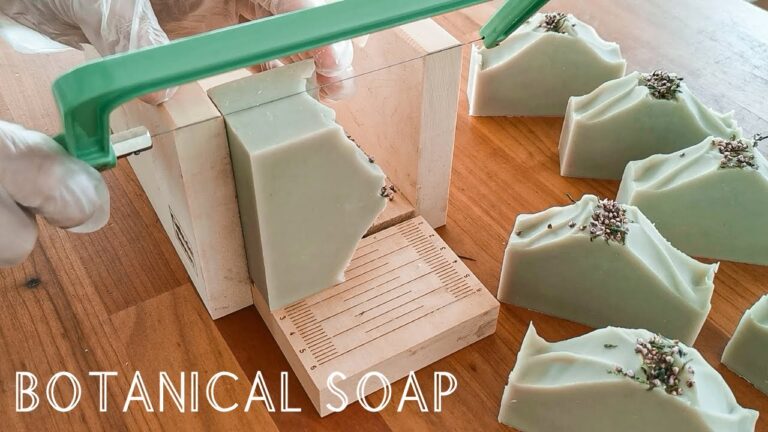In today’s environmentally conscious world, the demand for eco-friendly practices in soap production is higher than ever. With consumers increasingly concerned about the impact of traditional soap manufacturing on the planet, companies are stepping up to the challenge by implementing sustainable and ethical practices. From using organic ingredients to minimizing waste and packaging, the soap industry is embracing a greener approach to meet the needs of eco-conscious consumers. Join us as we explore the innovative ways in which soap producers are leading the way towards a more sustainable future.
Is soap environmentally friendly?
Soap is environmentally friendly due to its biodegradability. Traditional soap breaks down naturally over time without causing harm to the environment, making it a sustainable choice for daily use. This factor is crucial in evaluating the environmental impact of soap products, as it ensures that they do not contribute to pollution or harm ecosystems. By choosing biodegradable soap, individuals can make a positive impact on the environment and promote a cleaner, healthier planet for future generations.
How can soap be packed in an eco-friendly manner?
When it comes to packing soap eco-friendly, opting for kraft paper or printed fabric is a great alternative. Not only does this method reduce waste, but it also adds a touch of charm to your product. By choosing sustainable materials, you can minimize your environmental impact while still presenting your soap in an eye-catching way.
Which soap is more environmentally friendly?
When it comes to choosing an environmentally friendly soap, bar soap is the clear winner. Bar soap typically requires less packaging, reducing waste, and is often made with natural ingredients that are better for the environment. Additionally, bar soap has a lower carbon footprint compared to liquid soap due to its lighter weight and reduced water content. By opting for bar soap over liquid soap, you can make a simple yet impactful choice for a more sustainable lifestyle.
Sustainable Ingredients and Methods
In today’s world, the importance of sustainable ingredients and methods in our everyday lives cannot be overstated. By choosing ingredients that are sourced responsibly and using methods that minimize harm to the environment, we can make a positive impact on our planet. From organic fruits and vegetables to ethically raised meats, there are countless options available for those looking to make a difference through their food choices.
When it comes to sustainable methods, there are a variety of practices that can be implemented in both home kitchens and professional settings. Composting food scraps, using energy-efficient appliances, and reducing food waste are just a few examples of ways to lessen our environmental footprint. By making simple changes in our cooking and eating habits, we can contribute to a more sustainable future for generations to come.
Ultimately, the choices we make regarding the ingredients we use and the methods we employ in our cooking can have a profound impact on the health of our planet. By prioritizing sustainability in our food choices, we can help protect the environment, support ethical practices, and promote a healthier lifestyle for ourselves and future generations. Let’s work together to create a more sustainable world, one meal at a time.
Reducing Waste and Carbon Footprint
In today’s world, reducing waste and minimizing our carbon footprint is more important than ever. By adopting sustainable practices and making conscious choices, we can all play a part in creating a healthier planet for future generations. From reducing single-use plastics to implementing energy-efficient solutions, there are countless ways to make a positive impact on our environment.
One of the most effective ways to reduce waste and carbon footprint is to embrace a zero-waste lifestyle. This involves minimizing the amount of waste we produce and reusing, recycling, and composting whenever possible. By making small changes such as using reusable shopping bags, investing in a compost bin, and choosing products with minimal packaging, we can significantly decrease the amount of waste that ends up in landfills.
In addition to reducing waste, it is essential to address our carbon footprint by making sustainable choices in our daily lives. This can include opting for public transportation or carpooling, using energy-efficient appliances, and supporting businesses that prioritize eco-friendly practices. By collectively making these efforts, we can work towards a cleaner, more sustainable future for our planet.
Environmentally Conscious Packaging Solutions
In today’s environmentally conscious world, the demand for sustainable packaging solutions is on the rise. As companies strive to reduce their carbon footprint and minimize waste, eco-friendly packaging options are becoming increasingly popular. From biodegradable materials to reusable packaging designs, businesses are embracing environmentally conscious packaging solutions to not only meet consumer demands but also to contribute to a healthier planet. With a focus on sustainability, these innovative packaging options are not only eye-catching but also align with the growing global commitment to protect the environment. Whether it’s using recycled materials or implementing innovative designs, environmentally conscious packaging solutions are the way forward for businesses looking to make a positive impact on the planet.
Incorporating eco-friendly practices in soap production is not only beneficial for the environment, but also for the health and well-being of consumers. By utilizing sustainable ingredients, minimizing waste, and reducing energy consumption, soap manufacturers can make a significant impact on the planet. Embracing eco-friendly practices in soap production is a crucial step towards a more sustainable and responsible industry, and it is a choice that ultimately benefits all.



